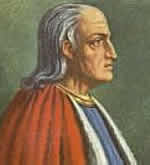The Ontological Argument of Anselm
Proslogium (Chapter II)
Truly there is a God, although the fool has said in his heart, There is no God.

AND so, Lord, do you, who do give understanding to faith, give me, so far as you know it to be profitable, to understand that you are as we believe; and that you are that which we believe. And indeed, we believe that you are a being than which nothing greater can be conceived. Or is there no such nature, since the fool has said in his heart, there is no God? (Psalm 14:1). But, at any rate, this very fool, when he hears of this being of which I speak --a being than which nothing greater can be conceived --understands what be hears, and what he understands is in his understanding; although he does not understand it to exist.
For, it is one thing for an object to be in the understanding, and another to understand that the object exists. When a painter first conceives of what he will afterwards perform, he has it in his understanding, but be does not yet understand it to be, because he has not yet performed it. But after he has made the painting, be both has it in his understanding, and he understands that it exists, because he has made it.
Hence, even the fool is convinced that something exists in the understanding, at least, than which nothing greater can be conceived. For, when he hears of this, he understands it. And whatever is understood, exists in the understanding. And assuredly that, than which nothing greater can be conceived, cannot exist in the understanding alone. For, suppose it exists in the understanding alone: then it can be conceived to exist in reality; which is greater.
Therefore, if that, than which nothing greater can be conceived, exists in the understanding alone, the very being, than which nothing greater can be conceived, is one, than which a greater can be conceived. But obviously this is impossible. Hence, there is doubt that there exists a being, than which nothing greater can be conceived, and it exists both in the understanding and in reality.
The Argument
Anselm’s ontological argument proposes that the very existence of God is built into the concept of God. The shape of his argument is one of reductio ad absurdum, which attempts to show that a hypothesis, if forced to its logical conclusions has absurd or unreasonable implications, such as that of the fool's, that God does not exist.
Anselm defines God as “that than which no greater can be conceived." All possibly imaginative attributes--power, goodness, presence, and so on--are therefore by definition God's. This includes the attribute of existence.
If nothing greater than God can be imagined, then a God who does not exist has one thing greater that can be imagined, namely, a God who does exist. According to Anselm a non-contingent being is by definition greater than a contingent being; it is greater for a thing to exist in reality than to exist only in the understanding. By definition the concept of God makes God's non-existence inconceivable. While it may be possible to imagine a God that doesn't exist, one cannot imagine a greatest of all possible beings without existence.
Therefore, the claim that God does not exist is a logical absurdity. Why? Because it would imply that a being, i.e. "God" (that than which no greater can be conceived) could exist in the mind and not in reality, thereby claiming to conceive a being which none greater can be conceived is greater than it actually is.
Questions
-
Do you find this argument convincing? Why or why not?
-
Has Aquinas sufficiently answered Anselm?
-
What would be the chief value of such an argument?
